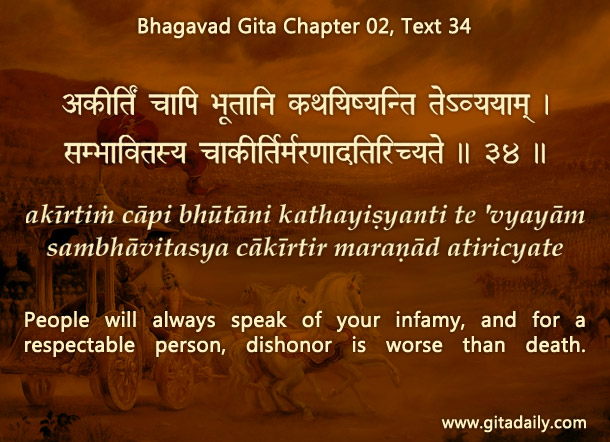Why be bothered by dishonor? – The Bhagavad-gita (02.34) declares that for those who have been honored, dishonor is worse than death. This verse raises the question: shouldn’t a wise person be unaffected by the world’s opinions? This is stated by the Gita itself later (06.07, 12.18, 14.24-25): the wise stay equipoised amid worldly dualities such as honor and dishonor.
Does the Gita contradict itself? No, the two statements are reconcilable when we appreciate an underlying, unifying truth: the Gita is user-friendly, providing multi-level guidelines for people at different levels of realization. Those who are spiritually evolved understand that their essential identity extends beyond their ego; the Gita exhorts them to stay steadfast amid honor and dishonor.
Though the Gita’s purpose is to help everyone evolve spiritually, it doesn’t neglect or reject those who are not yet there; it accommodates them by instructions appropriate for their level. How can the spiritually unevolved be motivated to act dutifully even when their duty is painful? By reminding them that if they give up their duty, they will bring upon themselves the immense pain of dishonor.
At the start of the Gita, Arjuna confronted a heart-wrenching prospect: a fratricidal war with venerable elders on the opposite site. Unfortunately, he was duty-bound to fight for establishing the rule of virtue in society, which was necessary to protect humanity from the self-serving miscreants who had unscrupulously grabbed power. To spur Arjuna into doing his duty, the Gita speaks at various levels ranging from the spiritually underdeveloped level (in 01.34) and the spiritually evolved level (in 06.07, 12.18, 14.24-25).
By thus providing wisdom customized to people at various levels, the Gita demonstrates its compassionate approach to sharing spiritual wisdom.
One-sentence summary:
The Gita’s contradictory-seeming statements can be reconciled by appreciating its compassionate approach of giving multi-level guidance for people at various levels of spiritual evolution.
Think it over:
- Why does the Gita contain opposing statements about dealing with dishonor?
- What is the Gita’s ultimate purpose?
- How does the Gita compassionately help those who are too far away from its ultimate purpose?
***
02.34: People will always speak of your infamy, and for a respectable person, dishonor is worse than death.
To know more about this verse, please click on the image


Srimad Bhagavad Gita is अपौरुषेय & cannot be affected by mundane setbacks of भ्रम प्रमाद विपिरलिप्सा करणापाटव ! हरि बोल 🙏